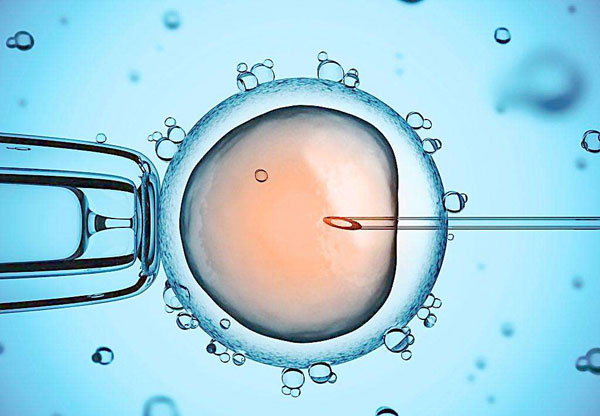當(dāng)前位置: Language Tips> 雙語新聞
Artificial human life could soon be grown in lab after embryo breakthrough
分享到
近日,《科學(xué)》雜志在線報(bào)道稱,劍橋大學(xué)的科學(xué)家們通過使用兩種干細(xì)胞以及一個(gè)三維支架,成功地創(chuàng)造出了一個(gè)能夠自行組裝的結(jié)構(gòu),其發(fā)育和構(gòu)造非常接近自然的小鼠胚胎。科學(xué)家的研究目的并非制造怪胎,而是為了探究人類的早期發(fā)育、妊娠失敗和遺傳缺陷。

Artificial human life could soon be grown from scratch in the lab, after scientists successfully created a mammal embryo using only stem cells.
在科學(xué)家成功利用干細(xì)胞培育出哺乳動(dòng)物胚胎后,人工制造的人類胚胎很快也將能夠被培育出來。
Cambridge University mixed two kinds of mouse stem cells and placed them on a 3D scaffold. After four days of growth in a tank of chemicals designed to mimic conditions inside the womb, the cells formed the structure of a living mouse embryo.
劍橋大學(xué)研究人員將兩種小鼠干細(xì)胞混合并放置在一個(gè)三維支架上,在模仿子宮內(nèi)條件的有化學(xué)物質(zhì)的容器內(nèi)長了四天,細(xì)胞形成了存活的小鼠胚胎結(jié)構(gòu)。
The breakthrough has been described as a ‘masterpiece’ in bioengineering, which could eventually allow scientists to grow artificial human embryos in the lab without the need for a sperm or an egg.
這一突破被稱為生物工程中的“杰作”,科學(xué)家們最終將可以在不需要精子或卵子的前提下,在實(shí)驗(yàn)室里培育出人工胚胎。
Growing embryos would help researchers to study the very early stages of human life so they could understand why so many pregnancies fail, but is likely to prove controversial and raise ethical questions about what constitutes human life.
培育人工胚胎將有助于研究人員研究人類活動(dòng)最早的階段,去探索很多人懷孕失敗的原因,但此舉有可能引發(fā)爭議,并提出什么構(gòu)成了人類生命的倫理問題。
Currently scientists can carry out experiments on leftover embryos from IVF treatments, but they are in short supply and must be destroyed after 14 days. Scientists say that being able to create unlimited numbers of artificial embryos in the lab could speed up research while potentially removing some of the ethical boundaries.
目前科學(xué)家能使用試管受精中的剩余胚胎繼續(xù)實(shí)驗(yàn),但供不應(yīng)求,并在14天后就必須被摧毀。科學(xué)家們說,在實(shí)驗(yàn)室中創(chuàng)造無限數(shù)量的人工胚胎可加快研究,但與此同時(shí)可能跨越了一些倫理界限。
“We think that it will be possible to mimic a lot of the developmental events occurring before 14 days using human stem cells," said Professor Magdalena Zernicka-Goetz from the Department of Physiology, Development and Neuroscience at Cambridge, who led the research.
“我們認(rèn)為,可以使用人類干細(xì)胞來模仿14天內(nèi)的發(fā)展變化。”研究帶頭人、劍橋大學(xué)生理發(fā)展和神經(jīng)科學(xué)系的Magdalena Zernicka Goetz教授說。
"We are very optimistic that this will allow us to study key events of this critical stage of human development without actually having to work on (IVF) embryos. Knowing how development normally occurs will allow us to understand why it so often goes wrong."
“這個(gè)研究將使我們不需要研究(人工授精)胚胎,就能研究人類發(fā)展重要階段的關(guān)鍵事件。知道如何正常發(fā)育才會(huì)讓我們明白,它經(jīng)常出錯(cuò)的原因所在。我們對此很樂觀。”
Britain is currently leading the world in fertility research, and last year a group at the Francis Crick Institute was granted permission to genetically modify human embryos, the first time in the world such a procedure had been approved by regulators.
英國目前的生育研究世界領(lǐng)先。2016年,弗蘭西斯克里克學(xué)院一個(gè)研究小組被批準(zhǔn)進(jìn)行基因改造的人類胚胎繁殖實(shí)驗(yàn),這是世界上首次獲得監(jiān)管機(jī)構(gòu)批準(zhǔn)的實(shí)驗(yàn)。
However such work raises important ethical questions about the sanctity of human life and whether it should be manipulated or created in the lab at all.
然而這樣的研究引發(fā)了關(guān)于人類生命的尊嚴(yán)和人類生命是否應(yīng)該被操縱或在實(shí)驗(yàn)室里創(chuàng)造的重要倫理問題。
Critics warn that allowing embryos to be grown for science opens the door to designer babies and genetically modified humans.
批評(píng)人士警告說,允許胚胎生長用于科學(xué)研究打開了訂制嬰兒和人類基因改造的大門。
英文來源:每日電訊報(bào)
翻譯:王鈺(中國日報(bào)網(wǎng)愛新聞iNews譯者)
編審:yaning
上一篇 : 加菲貓性別引發(fā)編輯大戰(zhàn)
下一篇 : 馮驥才:別指望人們靠幾臺(tái)節(jié)目就對詩歌感興趣
分享到
關(guān)注和訂閱

關(guān)于我們 | 聯(lián)系方式 | 招聘信息
電話:8610-84883645
傳真:8610-84883500
Email: languagetips@chinadaily.com.cn